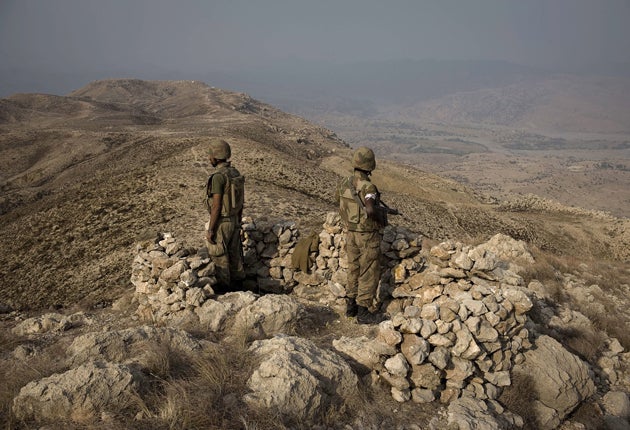Is world's most wanted man in these wild and lawless lands?
World Focus

Your support helps us to tell the story
From reproductive rights to climate change to Big Tech, The Independent is on the ground when the story is developing. Whether it's investigating the financials of Elon Musk's pro-Trump PAC or producing our latest documentary, 'The A Word', which shines a light on the American women fighting for reproductive rights, we know how important it is to parse out the facts from the messaging.
At such a critical moment in US history, we need reporters on the ground. Your donation allows us to keep sending journalists to speak to both sides of the story.
The Independent is trusted by Americans across the entire political spectrum. And unlike many other quality news outlets, we choose not to lock Americans out of our reporting and analysis with paywalls. We believe quality journalism should be available to everyone, paid for by those who can afford it.
Your support makes all the difference.Is it possible, more than eight years after the terror attacks on America, that the Pakistani army is finally closing in on Osama bin Laden?
The wild and lawless mountains of South Waziristan have resisted control and policing for well over a century. In the late 19th century, Mullah Powindah, known as "the wandering cleric", sprang up as the British Raj's fiercest enemy in these vast, arid mountains. Successive punitive operations and peace deals failed to tame him.
Schooled at a madrassa in the north-west, Powindah was the first religious leader of the area with political ambitions. He killed local tribal elders, rallied his men to wage "jihad", and even assumed the title of "king" (badshah) of the taliban. He was never killed or captured and the frontier he and his men haunted remained impregnable until well beyond the end of the British Raj.
But perhaps that is finally changing, thanks to a mixture of ferocious American arm-twisting, a belated Pakistani recognition of its own self-interest, and the awesome (and much resented) new technology of the Predator drone.
In August a CIA-operated Predator drone stuck down Baitullah Mehsud, the notorious Taliban commander. Despite the bitter criticism that such strikes evoke among ordinary Pakistanis, they have succeeded where all previous assaults have failed.
It is widely believed that the barren and forbidding mountains of Pakistan's tribal areas have been home to the core of al-Qa'ida ever since Bin Laden fled after the American bombing of Tora Bora in 2001. Senior western diplomats believe they are still there. But huge rewards have gone uncollected and no hard intelligence has emerged, to the huge frustration of the United States. Hillary Clinton was undiplomatic enough to bring that failure up this week. Yesterday she repeated the charge, telling a Pakistani interviewer: "This is a big government ... Somebody, somewhere in Pakistan must know where these people are."
But yesterday the interior minister Rehman Malik shot back: "There was a time when the world was telling us to do more. We have decided to fight back."
On the front line, as artillery fire boomed across the Sherwangai valley, military commanders exuded confidence. "We are doing a hardcore job fighting the terrorists," said Major General Khalid Rabbani, on top of a rocky hill. The expansive view around offered a rare look at the arid, borderlands that have been long suspected to serve as sanctuaries to the Pakistani Taliban and al-Qa'ida's senior leadership.
"They have given a good fight," added Maj Gen Rabbani, but now, many are being killed, and others are going deeper into the territory." It was impossible to confirm these details independently.
The stiffest challenge lies further ahead, in what the military's chief spokesman Maj Gen Athar Abbas called the "triangle of militancy". The army claimed yesterday that soldiers had mounted the hills around Sara Rogha, one of three notorious Taliban strongholds. The clashes brought the estimated death toll up to 289 militants and 34 soldiers.
The drones have been raining down on these mountains for so long that if Bin Laden was here he is surely long gone. Many in Pakistan believe he is long dead. Even clues suggesting that al-Qa'ida terrorists were here recently, such as the German and Spanish passports picked up this week, both tied to alleged al-Qa'ida members involved in the September 11 attacks, may mean less than meets the eye. How long have they been here? How did they get here? Nobody is saying.
Whatever other secrets this frontier surrenders, holding it will be a far more formidable challenge than seizing it. And for that, Predator drones will be of very little use.
Subscribe to Independent Premium to bookmark this article
Want to bookmark your favourite articles and stories to read or reference later? Start your Independent Premium subscription today.
Join our commenting forum
Join thought-provoking conversations, follow other Independent readers and see their replies
Comments